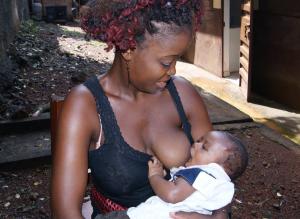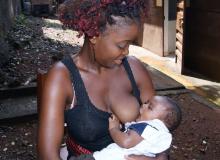Empowering clinical and non-clinical maternity hospital staff to promote early initiation and exclusive breastfeeding
The Ministry of Health and Sanitation in collaboration with WHO and partners is rolling out Baby Friendly Hospital Initiative to promote breastfeeding by training both clinical and non-clinical hospital personnel in the three regional hospitals and the University Teaching hospital (PCMH/ODCH) in the country. These trainings aim at equipping the clinical and non-clinical hospital staff with the knowledge and skills necessary to transform their health facilities into baby-friendly institutions through implementation of the Ten Steps to Successful Breastfeeding, and to sustain and improve advocacy on breastfeeding practices.
The first hour of a newborn’s life in particular is a critical window for establishing lactation and for providing mothers with the support they need to successfully breastfeed their babies. The world Health Organization recommends early initiation to breastfeeding within the first hour of birth and exclusive breastfeeding during the first six months of a baby’s life.
The Baby Friendly Initiative emphasizes the need to support, promote and sustain optimal breastfeeding in facilities providing maternity and newborn services.
The involvement of clinical and non-clinical health workers’ in the major hospitals aims to ensure that every staff member within a health facility setting can confidently support and promote early and exclusive breastfeeding in their everyday practices and to also empower them to discourage the use of breast milk substitutes by mothers.
Health facilities will be designated Baby Friendly if they successfully support, protect and promote breastfeeding practices within their work setting
The training is part of the Ministry’s continued effort to build capacity of health care providers to further improve quality of care for newborns and reduce risks of neonatal deaths. More than 500 non-clinical and over 100 clinical health facility personnel have been trained so far. The next step is to roll out the training to all maternity and child care staff in the targeted hospitals.

